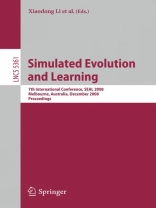This LNCS volume contains the papers presented at SEAL 2008, the 7th Int- national Conference on Simulated Evolutionand Learning, held December 7–10, 2008, in Melbourne, Australia. SEAL is a prestigious international conference series in evolutionary computation and learning. This biennial event was ?rst held in Seoul, Korea, in 1996, and then in Canberra, Australia (1998), Nagoya, Japan (2000), Singapore (2002), Busan, Korea (2004), and Hefei, China (2006). SEAL 2008 received 140 paper submissions from more than 30 countries. After a rigorous peer-review process involving at least 3 reviews for each paper (i.e., over 420 reviews in total), the best 65 papers were selected to be presented at the conference and included in this volume, resulting in an acceptance rate of about 46%. The papers included in this volume cover a wide range of topics in simulated evolution and learning: from evolutionarylearning to evolutionary optimization, from hybrid systems to adaptive systems, from theoretical issues to real-world applications. They represent some of the latest and best research in simulated evolution and learning in the world.
表中的内容
Evolutionary Learning.- Modelling Behaviour Cycles for Life-Long Learning in Motivated Agents.- Breaking the Synaptic Dogma: Evolving a Neuro-inspired Developmental Network.- A New Approach to Adapting Control Parameters in Differential Evolution Algorithm.- A Novel Genetic Algorithm with Orthogonal Prediction for Global Numerical Optimization.- Phylogeny Inference Using a Multi-objective Evolutionary Algorithm with Indirect Representation.- Evolved Look-Up Tables for Simulated DNA Controlled Robots.- Multi-objective Improvement of Software Using Co-evolution and Smart Seeding.- Policy Evolution with Grammatical Evolution.- A PSO Based Adaboost Approach to Object Detection.- Adaptive Non-uniform Distribution of Quantum Particles in m QSO.- Genetically Evolved Fuzzy Rule-Based Classifiers and Application to Automotive Classification.- Improving XCS Performance by Distribution.- Evolving an Ensemble of Neural Networks Using Artificial Immune Systems.- Improving the Performance and Scalability of Differential Evolution.- A Fuzzy-GA Decision Support System for Enhancing Postponement Strategies in Supply Chain Management.- Evolutionary Optimisation.- Solving the Delay-Constrained Capacitated Minimum Spanning Tree Problem Using a Dandelion-Encoded Evolutionary Algorithm.- Generalized Extremal Optimization for Solving Multiprocessor Task Scheduling Problem.- Improving NSGA-II Algorithm Based on Minimum Spanning Tree.- An Island Based Hybrid Evolutionary Algorithm for Optimization.- A Particle Swarm Optimization Based Algorithm for Fuzzy Bilevel Decision Making with Objective-Shared Followers.- Reference Point-Based Particle Swarm Optimization Using a Steady-State Approach.- Genetic Algorithm Based Methods for Identification of Health Risk Factors Aimed at Preventing Metabolic Syndrome.- Extremal Optimisation and Bin Packing.- Extremal Optimisation with a Penalty Approach for the Multidimensional Knapsack Problem.- A Generator for Multimodal Test Functions with Multiple Global Optima.- Choosing Leaders for Multi-objective PSO Algorithms Using Differential Evolution.- Comparison between Genetic Algorithm and Genetic Programming Performance for Photomosaic Generation.- Parameter Tuning of Real-Valued Crossover Operators for Statistics Preservation.- Hybrid Particle Swarm Optimization Based on Thermodynamic Mechanism.- Multiagent Evolutionary Algorithm for T-coloring Problem.- Non-photorealistic Rendering Using Genetic Programming.- Use of Local Ranking in Cellular Genetic Algorithms with Two Neighborhood Structures.- Information Theoretic Classification of Problems for Metaheuristics.- Task Decomposition for Optimization Problem Solving.- Discussion of Search Strategy for Multi-objective Genetic Algorithm with Consideration of Accuracy and Broadness of Pareto Optimal Solutions.- Discussion of Offspring Generation Method for Interactive Genetic Algorithms with Consideration of Multimodal Preference.- Solving Very Difficult Japanese Puzzles with a Hybrid Evolutionary-Logic Algorithm.- Joint Multicast Routing and Channel Assignment in Multiradio Multichannel Wireless Mesh Networks Using Simulated Annealing.- General Game Playing with Ants.- A Generalized Approach to Construct Benchmark Problems for Dynamic Optimization.- A Study on the Performance of Substitute Distance Based Approaches for Evolutionary Many Objective Optimization.- Performance Evaluation of an Adaptive Ant Colony Optimization Applied to Single Machine Scheduling.- Robust Optimization by ?-Ranking on High Dimensional Objective Spaces.- An Evolutionary Method for Natural Language to SQL Translation.- Attributes of Dynamic Combinatorial Optimisation.- A Weighted Local Sharing Technique for Multimodal Optimisation.- Hybrid Learning.- Hybrid Genetic Programming for Optimal Approximation of High Order and Sparse Linear Systems.- Genetic Vector Quantizer Design on Reconfigurable Hardware.- Pattern Learning and Decision Making in a Photovoltaic System.- Using Numerical Simplification to Control Bloat in Genetic Programming.- Horn Query Learning with Multiple Refinement.- Evolving Digital Circuits in an Industry Standard Hardware Description Language.- Parameterised Indexed FOR-Loops in Genetic Programming and Regular Binary Pattern Strings.- Hierarchical Fuzzy Control for the Inverted Pendulum over the Set of Initial Conditions.- Genetic Programming for Feature Ranking in Classification Problems.- Time Series Prediction with Evolved, Composite Echo State Networks.- Adaptive Systems.- Genetic Synthesis of Software Architecture.- Dual Phase Evolution and Self-organisation in Networks.- Heterogeneous Payoffs and Social Diversity in the Spatial Prisoner’s Dilemma game.- Theoretical Issues in Evolutionary Computation.- Crossover Can Be Constructive When Computing Unique Input Output Sequences.- Real-World Applications of Evolutionary Computation Techniques.- Power Electronic Circuits Design: A Particle Swarm Optimization Approach.- Computational Intelligence in Radio Astronomy: Using Computational Intelligence Techniques to Tune Geodesy Models.- An Efficient Hybrid Algorithm for Optimization of Discrete Structures.- Evolutionary Multi-Objective Optimization for Biped Walking.- A Method for Assigning Men and Women with Good Affinity to Matchmaking Parties through Interactive Evolutionary Computation.












